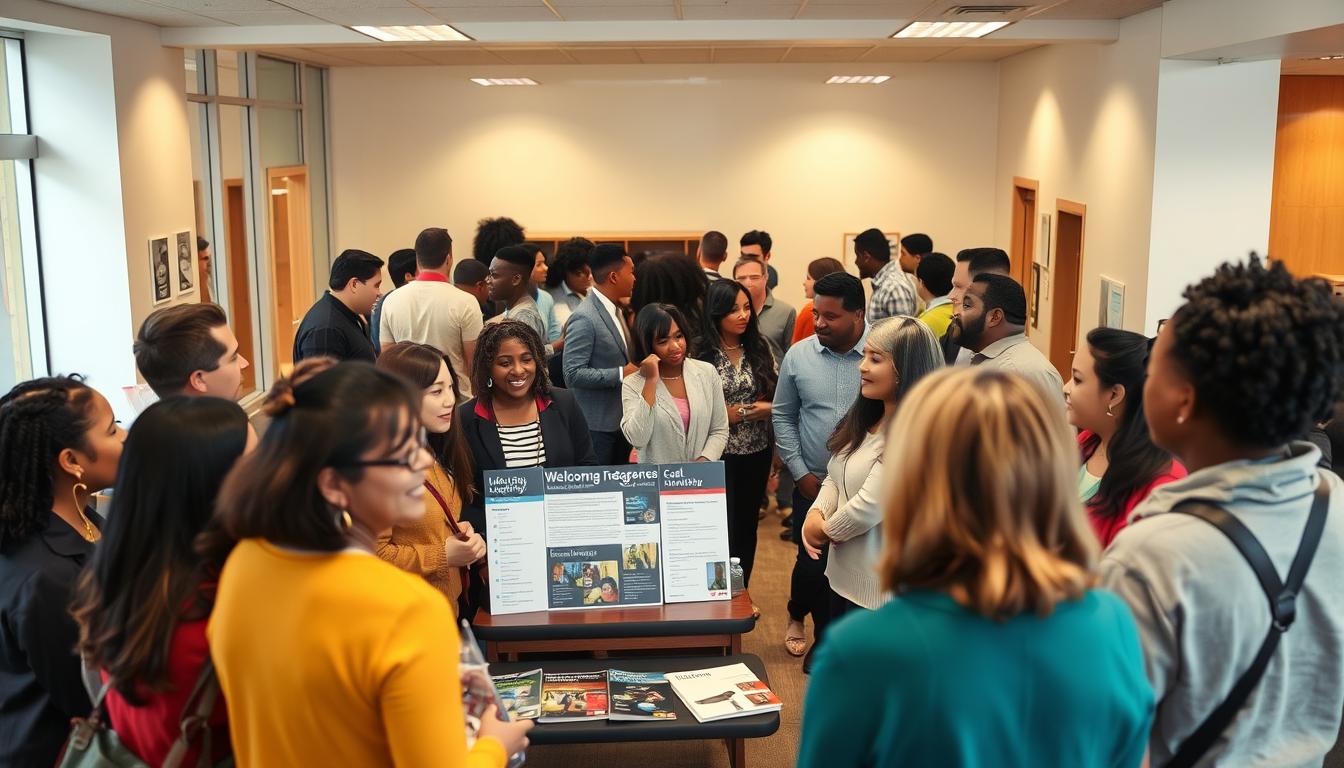Global Connections: Proven Strategies for Building Robust Networks Abroad
Anúncios
In today’s world, networking is key for career growth and business success. Making strong international connections boosts your career and brings in new ideas. It also helps you reach new markets and build lasting relationships worldwide.
This article will share tips on how to build and use your network abroad. You’ll learn how to succeed in the global market.
Understanding the Importance of Networking Opportunities
Networking is key to growing professionally and succeeding. It lets people meet and make connections that can boost their careers. In today’s world, knowing how to network is essential for career success.
What Are Networking Opportunities?
Networking opportunities are chances to connect, share, and work together. They can be events, conferences, workshops, or social gatherings. These places help build relationships and find new opportunities. Using these chances well can make you more known in your field.
The Value of Networking in the Global Arena
Networking is even more important globally. It helps professionals grow and connect with different cultures and markets. Research shows it can increase credibility, open new partnerships, and create global collaborations. Being able to navigate global networks is a big plus in today’s competitive world.
Identifying Key Networking Channels
Knowing where to network is key in today’s world. Different places offer unique chances to build relationships and grow your network. Whether it’s through formal groups or online, each has its own benefits for different goals.
Professional Associations and Organizations
Joining professional groups is a great way to network. They focus on specific areas, making it easier to meet people with similar interests. Members get access to workshops, conferences, and more, helping to build strong professional ties.
Online Platforms and Social Media
Online networking is big, and LinkedIn is a top choice. It lets you connect with people all over, share ideas, and join discussions. This way, you can reach more people and grow your network without limits.
Local Networking Events
Local events are great for making connections. Conferences, seminars, and meet-ups offer a chance to meet face-to-face. This personal touch can lead to lasting professional relationships and valuable collaborations.
Crafting an Effective Networking Strategy
Having a good networking strategy is key to growing your professional circle. It helps you make the most of networking opportunities. Start by setting clear goals for your networking efforts. These goals should be specific and measurable, focusing on both personal and professional growth.
Setting Clear Networking Goals
Setting networking goals gives you a roadmap for your efforts. Your goals might include making new connections, attending certain events, or reaching out to specific professionals. By setting these goals, you can track your progress and tweak your approach as needed. This leads to more meaningful and lasting connections.
Researching Target Industries and Key Players
Doing deep research on your target industries is crucial. It helps you find the key players who can help advance your career. Knowing the industry trends and major contributors lets you have informed conversations and targeted outreach. This knowledge makes your networking efforts more effective, opening doors to big opportunities.
Building a Personal Brand for Networking Success
Creating a strong personal brand is key to networking success. A well-built brand opens doors and leaves lasting impressions. It’s about defining what makes you different in your field.
This uniqueness grabs attention and helps make real connections. It’s a way to stand out and be remembered.
Defining Your Unique Value Proposition
Your unique value proposition shows what you bring to the table. It’s more than just your skills and experience. It’s about your approach and values.
To craft a strong proposition, think about your strengths, passions, and what makes you special. This clarity makes your brand shine, helping others see your value.
Utilizing Online Profiles and Portfolios
Online profiles are crucial for showcasing your brand. Sites like LinkedIn and personal websites are digital portfolios. They let you display your skills, achievements, and what makes you unique.
Keep these profiles up to date to reflect your current abilities. Being active in online professional communities boosts your visibility and career opportunities.
Leveraging Technology for Global Networking
In today’s world, technology is key for better networking. It helps professionals build relationships and find new opportunities. Digital tools have changed networking, making it easier to connect worldwide.
Utilizing Professional Networking Sites
Platforms like LinkedIn and Xing are great for growing your network. They let you:
- Meet leaders and peers from all over.
- Show off your skills and experiences.
- Find jobs and collaborations in your field.
- Join in on discussions that interest you.
Using these sites well can make you more visible. It also helps you make important connections.
Virtual Networking Events: Benefits and Tips
Virtual events have changed how we connect. They’re especially popular now. They offer:
- Access from anywhere, no need to travel.
- They’re cheaper, saving on travel costs.
- Chance to meet people from different places.
To get the most out of virtual events, remember:
- Have a short introduction ready.
- Be active in group chats.
- Stay in touch with new contacts after the event.
Learning to network online can open up new opportunities. It helps you build a global network.
Cultural Considerations in Networking
Networking globally means understanding different cultures and how they communicate. Each culture has its own way of connecting with others. Knowing these differences can make networking better and avoid misunderstandings.
Understanding Cross-Cultural Communication
Good cross-cultural communication is key to building strong relationships. Not all cultures network the same way. For example, in some places, you need to build a personal connection before talking business. Others value being direct and quick.
It’s important to listen well and watch body language. These can change a lot between cultures and impact how well you connect.
Adapting to Different Networking Norms
Networking rules can change from one country to another. In some cultures, group ties are more important. In others, personal success is the focus. Knowing these differences helps you connect better.
For example, in the U.S., a handshake is common. But in Japan, bowing is more fitting. Not knowing these differences can lead to awkward moments.
The Role of Follow-Up in Networking
Follow-up is key to successful networking. It greatly affects future interactions and relationships. By managing follow-up well, connections stay strong and productive. Professionals can improve their networking by following up strategically.
Best Practices for Following Up
Good follow-up practices are crucial for keeping in touch with contacts. Here are some tips:
- Timing is key: Contact new connections within 24 to 48 hours to keep the connection alive.
- Personalize your message: Make follow-up messages specific by mentioning what you talked about first.
- Choose the right medium: Use email for formal stuff and social media for casual chats, based on the situation.
Tools for Effective Follow-Up Management
Using the right tools makes managing follow-up easier. Here are some great options:
- CRM Software: Tools like HubSpot and Salesforce help track interactions and remind you of follow-ups.
- Email Scheduling Tools: Services like Boomerang let you schedule emails for the best time.
- Note-Taking Applications: Evernote and Notion help organize meeting notes, making follow-up messages more personal.
Networking Etiquette in Different Countries
Understanding networking etiquette in various cultures is key to success. Knowing the customs of different countries helps build stronger professional ties. It also helps avoid common mistakes in networking.
Country-Specific Networking Customs
Each country has its own way of networking. For example:
- Japan: Bowing is a common greeting, and exchanging business cards is a ritual that requires both hands.
- Germany: Punctuality is highly valued, portraying respect for others’ time during networking events.
- Brazil: Personal connections often take precedence; taking time to socialize before discussing business is beneficial.
Knowing these customs helps you fit in better. It makes networking more enjoyable and effective.
Common Pitfalls to Avoid
It’s important to know the local customs and avoid common mistakes. These include:
- Misinterpreting communication styles, which can lead to misunderstandings or offense.
- Overlooking the significance of hierarchy in professional settings, especially in cultures where respect for authority is paramount.
- Failing to follow up appropriately after initial meetings can hinder the establishment of lasting connections.
By avoiding these mistakes, you can network more confidently and effectively in different places.
Creating Diverse Networking Opportunities
Diverse networking is key for professional growth. It opens up new views and insights from different angles. Working with local professionals strengthens connections and helps grasp market specifics.
Collaborating with Local Professionals
Teaming up with local experts brings real-world knowledge of various industries and cultures. This partnership sparks new ideas and innovations. It leads to wins for everyone involved.
Joining Multicultural Networking Groups
Being part of multicultural groups brings diverse views and experiences. These groups promote cultural exchange and understanding. They help build a richer professional network.
As you grow your connections in these groups, you open doors to new collaborations. You also create lasting relationships that spark creativity and drive growth.
Measuring Networking Success
Understanding how to measure networking success is key. To get the most from professional relationships, focus on specific goals. These goals show the real value of your networking efforts.
They help see the impact of your connections. They also guide you in making your networking better.
Key Performance Indicators to Track
It’s important to track key performance indicators to see if your networking is working. Some important metrics include:
- Number of new connections made in a certain time.
- Collaborations and partnerships from your networking.
- Job offers or project chances from your connections.
- Follow-up talks showing you’re still in touch.
Reflecting on Networking Outcomes
Looking back at your networking efforts is vital for growth. This helps you:
- See what strategies worked best for you.
- Find out which metrics led to the best connections.
- Change your networking ways based on what you’ve learned.
- Keep growing personally and professionally by always checking yourself.
Networking Beyond Business: Building Meaningful Relationships
Networking is more than just business deals. It’s about building real connections that help us grow. By making personal connections, we build trust and teamwork. This can lead to new chances we never saw coming.
Getting involved in community activities is key. It’s where we find these meaningful relationships. It shows the human side of networking.
The Importance of Personal Connections
Personal connections are the heart of networking. They help us form lasting bonds. When we share our interests and successes, we build a network based on real understanding.
This kind of connection makes teamwork better in business. It also leads to friendships that support us in many ways.
Engaging in Community Activities
Being part of community activities boosts our networking. It shows we care about the community, building trust. By joining local events, we meet people with similar passions.
These activities make our connections stronger. They help us achieve our goals and make our community stronger too.
Continuous Learning and Improvement in Networking
In today’s fast-changing world of networking, always learning is key. People looking to get better at networking can really benefit from workshops and seminars. These events are great for sharing stories and learning from experts who are doing well globally.
Attending Workshops and Seminars
Going to networking workshops lets you try out new ways and strategies. You get to learn by doing and meet others with the same goals. These workshops have interactive parts that help you understand and improve your networking skills.
Seeking Feedback on Networking Efforts
Getting feedback on your networking is also important. Hearing from people you trust can show you what you need to work on. This feedback is crucial for making your networking better and keeping up with the changing world of networking.
FAQ
What are some effective networking strategies to enhance career growth?
How can I leverage online networking opportunities successfully?
What key networking skills should I develop to improve my connections?
Are there best practices for following up after networking events?
How can cultural considerations impact networking in a global context?
What tools can assist in managing follow-up tasks after networking events?
Why is personal branding important in networking?
How can I measure the success of my networking efforts?
Published on: 28 de March de 2025

Luke Martin
Luke Martin, author of Credwallets.com, is a mathematics graduate with a specialization in financial markets. Known for his love of pets and his passion for sharing knowledge, Luke created the site to provide valuable insights into the complexities of the financial world. His approachable style and dedication to helping others make informed financial decisions make his work accessible to all, whether they're new to finance or seasoned investors.







